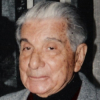Augusto Roa Bastos

Augusto Roa Bastos
Augusto Roa Bastoswas a Paraguayan novelist and short story writer. As a teenager he fought in the Chaco War between Paraguay and Bolivia, and he later worked as a journalist, screenwriter and professor. He is best known for his complex novel Yo el Supremoand for winning the Premio Miguel de Cervantes in 1989, Spanish literature's most prestigious prize. Yo el Supremo explores the dictations and inner thoughts of Dr. José Gaspar Rodríguez de Francia, who ruled Paraguay with an iron...
NationalityParaguayan
ProfessionNovelist
Date of Birth13 June 1917
CountryParaguay
Forms disappear, words remain, to signify the impossible.
It is not by believing but by doubting that one can attain to the truth, which is ever changing form and condition.
Letters couldn't care less whether what is written with them is true or false.
Anyone who attempts to relate his life loses himself in the immediate. One can only speak of another.
The things that have come into being change continually. The man with a good memory remembers nothing because he forgets nothing.
What happens is that your wretched memory remembers the words and forgets what's behind them
There were epochs in the history of humanity in which the writer was a sacred person. He wrote the sacred books, universal books, the codes, the epic, the oracles. Sentences inscribed on the walls of the crypts; examples in the portals of the temples. But in those times the writer was not an individual alone; he was the people.
Facts can't be recounted; much less twice over, and far less still by different persons. I've already drummed that thoroughly into your head.
There is always time to take more time.
Man is an idiot. He doesn't know how to do anything without copying, without imitating, without plagiarizing, without aping. It might even have been that man invented generation by coitus after seeing the grasshopper copulate.
The great principle of Justice: prevent crime rather than punish it. All that is needed to execute a guilty man is a firing squad or a hangman. To prevent there being guilty men requires great astuteness.
In all nations an exceptional man exists that compensates the deficiencies of the remainder. In those moments, when humanity is found collectively in a state of decadence, there always remain those exceptional beings as point of reference.
To write does not mean to convert the real into words but to make the power of the word real.